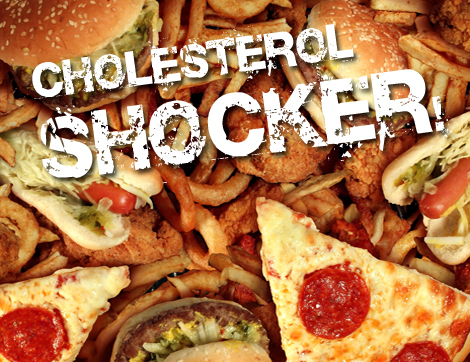
• Medicrats concede: Saturated fat does not lead to heart disease.
By James Spounias —
In a stunning reversal of decades of dogma, the United States Dietary Guidelines Advisory Committee (DGAC) issued a draft report that increased the limit of recommended fat in the American diet because “cholesterol is not considered a nutrient of concern for over consumption.” In other words, the stern commands to avoid “artery clogging” fat were bunk. Now, it’s becoming acceptable to say that consumption of fatty foods, such as eggs, meat and dairy, will not increase cholesterol levels, which are said to be a cause of heart disease.
For those who knew of the cholesterol hoax, the admission by establishment notables is an encouraging sign, though one can’t help but be skeptical given the machinations of power.
Are food, pharmaceutical and medical cartels and compromised government officials just playing sleight of hand? It’s too soon to know.
USA Today quoted noted cardiologist Dr. Steven E. Nissen, chairman of cardiovascular medicine at the Cleveland Clinic, who said: “It’s the right decision. We got the dietary guidelines wrong. They’ve been wrong for decades.”
Nissen noted that only 20% of a person’s blood cholesterol—the levels measured with standard cholesterol tests—comes from diet. The rest comes from genes, he said.
“We told people not to eat eggs,” Nissen said. “It was never based on good science.”
USA Today added, “Advice to avoid foods high in fat and cholesterol led many Americans to switch to foods high in sugar and carbohydrates, which often had more calories.”
“We got fatter and fatter,” said Nissen. “We got more and more diabetes.”
Recent studies even suggest that longtime advice on saturated fat and salt may also be wrong, added Nissen.
How does it happen that decades of anti-fat propaganda passed off as science are now dismissed as an “oops”?
Alternative health advocates knew long ago that attacks on saturated fat were without merit. Years ago, Tom Valentine exposed the fraud of anti-fat godfather Ancel B. Keys, who falsely claimed that saturated fats caused heart disease and that polyunsaturated fat from soy, sunflower and corn oils would reduce cholesterol levels.
Keys gathered data from 22 countries, but cherry-picked facts from only seven to support his thesis. Keys became a powerful figure. In 1984 he garnered a spot on the American Heart Association’s advisory committee and helped fashion the “low-fat” phenomena, under the misnamed “Mediterranean diet.”
For decades, power trumped science. There were no human studies to support Keys’s anti-saturated fat thesis, only a study of rabbits being fed saturated fats and manipulated population data substantiated his position. When powerful interests form to create an international food and drug market, the truth doesn’t matter. On the one hand, the food industry gave us an abundance of processed sugar to replace good fat and the pharmaceutical wing gave us powerful anti-cholesterol drugs. Both brought havoc to good health.
Two researchers were noted for daring to criticize Keys’s theory.
Danish researcher Dr. Uffe Ravnskov noted that had Keys included all 22 countries he supposedly surveyed, the connection between saturated fat and heart disease would have been nonexistent. Ravnskov wrote of the benefits of fat and cholesterol, wryly noting: “While the death rate from coronary disease increased inmost countries after World War II it decreased in Switzerland. If this decrease had been followed by a decline in the intake of animal fat, Switzerland would have been a model for healthcare in other countries. But Switzerland is never mentioned because parallel with the declining heart mortality, the Swiss intake of animal fat increased by 20%.”
In Great Britain, researcher John Yudkin, founder of the nutrition department at the University of London’s Queen Elizabeth College, linked the rise of heart disease to an increase in the consumption of sugar, not fat. Yudkin noticed a spike in triglycerides and insulin when test animals were fed sugars. Yudkin’s 1972 book entitled “Pure, White and Deadly: How Sugar Is Killing Us And What We Can Do To Stop It” openly questioned whether dietary fat had anything to do with heart disease and instead implicated sugar.
“If only a small fraction of what we know about the effects of sugar were to be revealed in relation to any other material used as a food additive,” he wrote, “that material would promptly be banned.”
Ravnskov and Yudkin’s critiques were poignant yet largely ignored in the face of establishment indoctrination of the low fat myth.
In June of 1999, after 11 years of attempting to write a definitive report linking fat to heart disease, the U.S. Surgeon General’s office gave up. The official statement concluded that administrators “did not anticipate fully the magnitude of the additional external expertise and staff resources that would be needed.”
A committee member was more candid when he revealed, “the report was initiated with a preconceived opinion of the conclusions.”
But even though it took decades for the establishment to inch toward a conclusion that was obvious to health advocates, it doesn’t mean the actual connection between cholesterol and heart disease is any closer to resolution.
Alternative, or “integrative” cardiologists and health advocates point to numerous factors that contribute to heart disease, such as hydrogenated vegetable oils, homogenized and pasteurized dairy, fluoridated and chlorinated water, tobacco, lack of adequate vitamins and minerals and infectious viruses and bacteria, to name a few.
MORE FROM JIM:
- Beware Mainstream Media Hype on Alpha, Beta Carotenes
- Link in Senior Deaths Exposed
- The Electromagnetic Assault on Our Brains and Bodies
- Doctors Say Wireless Devices to Blame for Raft of Illnesses
James Spounias is the president of Carotec Inc., originally founded by renowned radio show host and alternative health expert Tom Valentine and his wife, Carole. To receive a free issue of Carotec Health Report—a monthly newsletter loaded with well-researched and reliable alternative health information—please write Carotec, P.O. Box 9919, Naples, FL 34101 or call 1-800-522-4279. Also included will be a list of the high-quality health supplements Carotec recommends.

